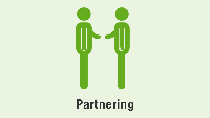Sustainability
BASF is founding member of “value balancing alliance e.V.”
August 19, 2019
Which values do companies create for society – in environmental, human, social, and financial terms? And how can these contributions be measured and compared? Together with seven international companies of the recently founded “value balancing alliance e.V.”, based in Frankfurt am Main, Germany, BASF strives to create a standard that makes this holistic value creation transparent in monetary terms.
The alliance is supported by the accounting firms Deloitte, EY, KPMG, PwC and by the OECD amongst others. Founding members of the nonprofit organization are, next to BASF, the companies Bosch, Deutsche Bank, LafargeHolcim, Novartis, Philip Morris International, SAP, and SK.

“It is about changing the perspective on how companies create value,” said Saori Dubourg, Member of the Board of Executive Directors of BASF SE. “With a holistic view on values, we want to take into account our impacts on the environment, society and businesses. Creating long-term values is the foundation for sustainable business success.”
The target of the value balancing alliance is to create and pilot a model for the calculation of the multidimensional value contribution and to further develop the disclosing and reporting obligations accordingly within the next three years. “In the alliance, we want to standardize the different approaches that are currently used by the companies to make the results comparable. In this way, we can make the real value creation to the society by companies transparent,” explains Christian Heller, CEO of the value balancing alliance e.V.
BASF for example has measured its multidimensional value creation along the value chain with its “Value-to-Society” program since 2013. Together with external experts, BASF has developed this approach to perform a monetary assessment of the economic, ecological, and social impacts of its business activities along the value chain. BASF shares its experiences in networks and initiatives such as the World Business Council for Sustainable Development (WBCSD), the Natural Capital Coalition, the Impact Valuation Roundtable or the Embankment Project for Inclusive Capitalism. BASF is also involved in the corresponding standardization processes within the International Organization for Standardization (ISO).
